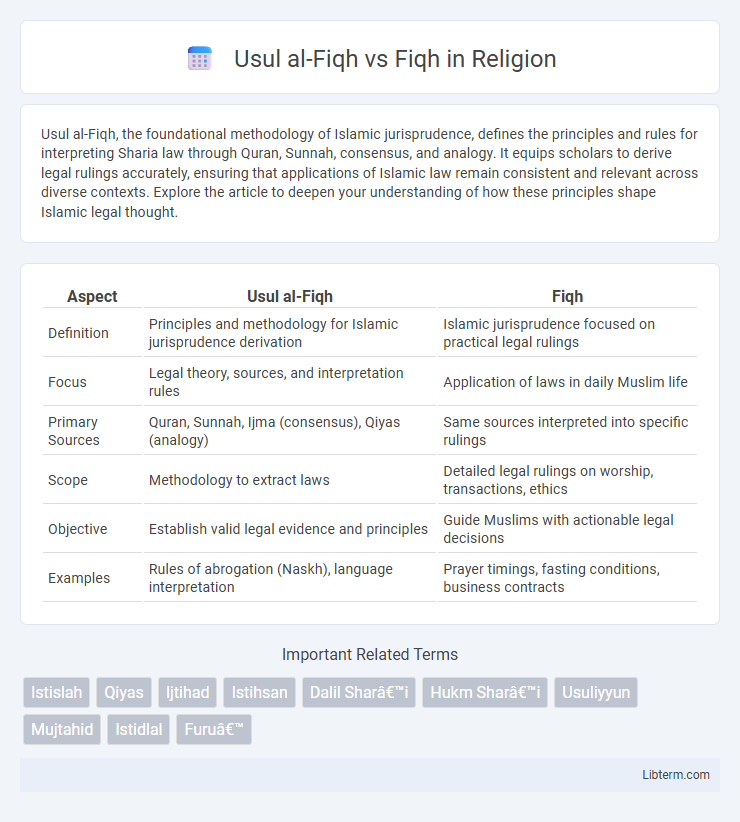Usul al-Fiqh, the foundational methodology of Islamic jurisprudence, defines the principles and rules for interpreting Sharia law through Quran, Sunnah, consensus, and analogy. It equips scholars to derive legal rulings accurately, ensuring that applications of Islamic law remain consistent and relevant across diverse contexts. Explore the article to deepen your understanding of how these principles shape Islamic legal thought.
Table of Comparison
| Aspect | Usul al-Fiqh | Fiqh |
|---|---|---|
| Definition | Principles and methodology for Islamic jurisprudence derivation | Islamic jurisprudence focused on practical legal rulings |
| Focus | Legal theory, sources, and interpretation rules | Application of laws in daily Muslim life |
| Primary Sources | Quran, Sunnah, Ijma (consensus), Qiyas (analogy) | Same sources interpreted into specific rulings |
| Scope | Methodology to extract laws | Detailed legal rulings on worship, transactions, ethics |
| Objective | Establish valid legal evidence and principles | Guide Muslims with actionable legal decisions |
| Examples | Rules of abrogation (Naskh), language interpretation | Prayer timings, fasting conditions, business contracts |
Introduction to Usul al-Fiqh and Fiqh
Usul al-Fiqh serves as the foundational methodology for Islamic jurisprudence, providing the principles and framework to derive rulings from primary sources such as the Quran and Sunnah. Fiqh represents the actual body of Islamic law developed through the application of these principles to specific cases and contexts. Understanding Usul al-Fiqh is essential for interpreting Fiqh accurately, ensuring that legal judgments remain consistent with the core objectives of Sharia.
Defining Usul al-Fiqh: Foundations of Islamic Jurisprudence
Usul al-Fiqh refers to the fundamental principles and methodologies used to derive Islamic legal rulings, forming the foundation of Islamic jurisprudence. It encompasses sources such as the Quran, Sunnah, consensus (Ijma), and reasoning (Qiyas) to ensure proper interpretation and application of Sharia law. Unlike Fiqh, which deals with the practical implementation of these rulings, Usul al-Fiqh focuses on the theoretical framework and criteria guiding the extraction and validation of legal judgments.
Understanding Fiqh: Application of Islamic Law
Usul al-Fiqh serves as the foundational methodology for interpreting Islamic law, establishing principles and rules for deriving legal rulings. Fiqh represents the practical application of these derived rulings, addressing specific issues encountered by Muslims in daily life. Understanding Fiqh requires a thorough grasp of Usul al-Fiqh to ensure accurate and contextual implementation of Shariah.
Historical Development of Usul al-Fiqh and Fiqh
Usul al-Fiqh, the foundational principles of Islamic jurisprudence, evolved during the early centuries of Islam to provide a systematic methodology for interpreting the Quran and Hadith, distinguishing it from the practical application found in Fiqh. Fiqh, as the body of Islamic law, developed through the accumulation of legal rulings and practices by scholars in various Islamic regions, reflecting localized contexts and the dynamic nature of Muslim societies. The historical development of Usul al-Fiqh formalized the tools needed to derive rulings, while Fiqh represents the codified outcomes of these interpretative efforts.
Core Objectives: Usul al-Fiqh vs Fiqh
Usul al-Fiqh serves as the foundational methodology that establishes the principles, sources, and rules for interpreting Islamic law, ensuring consistency and accuracy in deriving legal rulings. Fiqh represents the application of these principles to specific cases, providing practical laws governing daily life and religious practices. The core objective of Usul al-Fiqh is to develop a systematic framework for legal reasoning, whereas Fiqh aims to implement this framework to address concrete issues faced by Muslims.
Methodologies: Principles vs Practice
Usul al-Fiqh serves as the foundational methodology providing principles and standards for interpreting Islamic law, including sources like the Quran, Sunnah, consensus (ijma), and analogical reasoning (qiyas). Fiqh, by contrast, applies these principles practically in deriving specific rulings on daily matters such as worship, transactions, and personal conduct. Understanding Usul al-Fiqh's theoretical frameworks enhances the contextual and consistent application of Fiqh in diverse circumstances.
Sources of Law: Usul al-Fiqh and Fiqh Perspectives
Usul al-Fiqh provides the foundational principles and methodologies for deriving Islamic law, emphasizing primary sources like the Qur'an, Sunnah, consensus (Ijma), and analogical reasoning (Qiyas). Fiqh applies these principles to formulate practical rulings and legal judgments addressing everyday issues faced by the Muslim community. While Usul al-Fiqh analyzes the legitimacy and scope of sources, Fiqh operationalizes these rulings into actionable guidelines for compliance with Sharia.
Roles of Scholars in Usul al-Fiqh and Fiqh
Usul al-Fiqh establishes the foundational principles and methodologies that guide Islamic legal reasoning, while Fiqh applies these principles to derive specific rulings. Scholars of Usul al-Fiqh specialize in developing and refining the frameworks for interpretation, ensuring consistency and coherence in legal analysis. Fiqh scholars utilize these established methodologies to address practical issues, issuing rulings that govern daily life according to Islamic law.
Contemporary Relevance and Challenges
Usul al-Fiqh serves as the methodological foundation for interpreting Shariah, providing principles and tools necessary for deriving Fiqh rulings that address contemporary issues. Contemporary relevance of Usul al-Fiqh lies in its capacity to adapt classical jurisprudential frameworks to modern contexts, such as bioethics, finance, and human rights, by incorporating maqasid al-shariah (objectives of Islamic law). Challenges include balancing traditional interpretations with evolving social realities and technological advancements, while maintaining fidelity to core Islamic principles.
Key Differences and Interconnections
Usul al-Fiqh serves as the foundational methodology and principles guiding the interpretation and application of Islamic law, whereas Fiqh represents the practical jurisprudence derived from these principles to address specific legal issues. The key difference lies in Usul al-Fiqh's role in establishing the sources and tools--such as the Quran, Sunnah, consensus (Ijma), and analogical reasoning (Qiyas)--for deriving rulings, while Fiqh applies these rulings to concrete situations in daily life. Their interconnection is essential, as sound Fiqh depends on a robust understanding of Usul al-Fiqh to ensure correct, consistent legal judgments within the framework of Shariah.
Usul al-Fiqh Infographic

 libterm.com
libterm.com